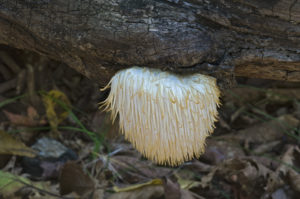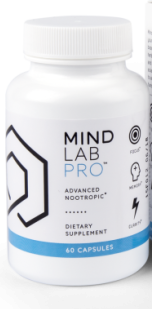Table of Contents
Lion’s Mane (Hericium erinaceus) is unique in the mushroom family both in appearance and function. Lion’s Mane Mushroom is extremely effective at stimulating Nerve Growth Factor (NGF) in the brain.
Known for its powerful effects as a “brain tonic”, Lion’s Mane is said to have been used as a tea for thousands of years by Buddhist monks. To enhance brain power, and heighten their ability to focus during meditation.
Lion’s Mane as a nootropic, is a powerful catalyst for brain cell regeneration helping improve memory and cognition.
The primary active compounds in Lion’s Mane are hericenones and erinacines. Erinacines help your brain produce more Nerve Growth Factor. Erinacines easily cross the blood-brain barrier to boost the production of neurons.
Lion’s Mane helps:
- Nerve Growth Factor. Lion’s Mane Mushroom prevents and treats nerve damage in the brain. Once past the blood-brain barrier, Lion’s Mane stimulates enzyme production that release Nerve Growth Factor (NGF). Nerve regeneration helps relieve neurodegenerative disease symptoms such as Alzheimer’s, dementia, and Parkinson’s Disease.
- Neurogenesis. Lion’s Mane stimulates the repair and creation of neurons. Boosting neurotransmitters and signaling that effects memory, learning, recall, and mood.
- Brain Optimization. Lion’s Mane helps eliminate brain fog. Restoring memory and mental alertness. And improves anxiety and depression symptoms.
Overview
Lion’s Mane (Hericium erinaceus) is a medicinal mushroom proven to benefit the brain, nerves and immune system.
Unlike other mushrooms sporting a cap and stem, Lion’s Mane has long, flowing, white tendrils. Resembling a lion’s mane. Other names include Monkey’s Head, Bearded Tooth, Pom Pom Blanc, Hedgehog Mushroom and Satyr’s Beard.

This parasitic fungus grows hanging off logs and trees. And is native to North American, Europe and Southeast Asia. In Japan, it’s called yamabushitake or “those who sleep in mountains”. Referring to the Shugendo sect of hermit monks and their long, flowing robes.
As a nootropic, Lion’s Mane has been shown to be particularly effective in stimulating Nerve Growth Factor (NGF) in the brain.
NGF is produced in the hippocampus throughout life. Modulating cholinergic receptors and neuroplasticity.[i] And is essential for learning.
Nerve Growth Factor are special proteins that function to regenerate neurons. Lion’s Mane contains two unique classes of NGF’s – hericenones and erinacines which easily cross the blood-brain barrier.
Lion’s Mane, like other medicinal mushrooms, contain high amounts of the antioxidant beta-glucoxylan and four other polysaccharides and polypeptides. Having a significant impact on enhancing your immune system. And decreasing tumor growth.
Lion’s Mane has also been studied in reducing amyloid plaques. These clumps of beta-amyloid proteins block signals between neurons. And are implicated in Alzheimer’s and other neurodegenerative diseases.
Lions’ Mane is also used to treat Lyme’s Disease, and digestive tract issues.
Here we’re talking about Lion’s Mane Mushroom and its effects on brain health and chemistry.
How does Lion’s Mane Work in the Brain?
Lion’s Mane boosts brain health and function in several ways. But two in particular stand out.
- Lion’s Mane Mushroom stimulates the synthesis of Nerve Growth Factor (NGF). NGF is a protein that plays a major role in the maintenance, survival and regeneration of neurons.
NGF is required by your brain to keep neurons strong and healthy. When various neurological disorders occur, your brain is unable to produce its own internal source of NGF.
In a study done in Kuala Lumpur in 2013, scientists showed that Lion’s Mane extract induced NGF synthesis and promoted neurite outgrowth.[ii]
- Lion’s Mane is effective in reducing anxiety and depression. Some even call it the “smart mushroom” for its ability to improve cognition, memory and work as an anti-depressant.
A study by researchers in Japan worked with 30 women. The female subjects had been complaining about menopause, depression, sleep quality and other issues.
The women randomly received Lion’s Mane-laced cookies or a placebo for 4 weeks. The researchers found that Lion’s Mane “has the possibility to reduce depression and anxiety, and these results suggest a different mechanism from NGF-enhancing action of H. erinaceus”. [iii]
How things go bad
Science once believed that the brain could not grow new brain cells. That once our brain developed during childhood, and we reached adulthood, we had all the brain cells we’d ever have.
Now we know that neurons can regenerate. But that doesn’t mean they will regenerate. A number of health issues can contribute to neurodegeneration.
↓ Decrease in Nerve Growth Factor = Decrease in Long-Term Potentiation affecting long-term memory[iv]
↓ Brain cells die and are not replaced
↓ Neuroplasticity declines resulting in poor memory
↓ Neurotransmitters decline resulting in anxiety, poor mood and depression
All of these age-related changes are contributing factors to neurodegenerative diseases like Alzheimer’s, Parkinson’s and others. And anxiety, depression and mood disorders that affect quality of life.
Lion’s Mane benefits
At least a dozen peer-reviewed studies have been published on Lion’s Mane benefits to brain health since 1991. Dr. Kawagishi of Japan was first to identify Nerve Growth Factor properties in Lion’s Mane Mushroom.[v]
In one double-blind, placebo-controlled trial, researchers in Japan worked with 50 – 80 year old men and women. All suffered from mild cognitive impairment.
The trial subjects received four 250 mg tablets containing 96% of Yamabushitake (Lion’s Mane) dry powder three times a day for 16 weeks. The men and women were tested at 4, 8, 12 and 16 weeks.
At each of the testing periods, the subjects who had used Lion’s Mane showed a significant improvement in cognitive scores. And their scores were increasing while on Lion’s Mane supplementation. But 4 weeks after stopping Lion’s mane supplementation, their cognitive scores decreased significantly.
The researchers concluded that Lion’s Mane Mushroom is effective in improving mild cognitive impairment.[vi]
How does Lion’s Mane feel?
You may not experience the effects of supplementing with Lion’s Mane Mushroom immediately. But many users report with continued use of Lion’s Mane, a boost in mood and mental energy.
 Some report it increases depth perception. And an improvement in sense of smell.
Some report it increases depth perception. And an improvement in sense of smell.
Others testify to improved decision-making, the ability to solve problems and learning. Likely due to Lion’s Mane ability to improve neuroplasticity.
The overall consensus is Lion’s Mane Mushroom’s ability to lessen anxiety, reduce depression, and improve concentration.
Lion’s Mane Clinical Research
Lion’s Mane Mushroom has been used as a food and herbal medicine since ancient times in East Asia. And it has been reported in scientific research that Lion’s Mane promotes Nerve Growth Factor both in the petri dish as well as in animal and human test subjects.
Lion’s Mane Prevents Cognitive Dysfunction
In this study, researchers examined the effects of Lion’s Mane on amyloid β(25-35) peptide-induced learning and memory deficits in mice. Amyloid β(25-35) peptide is implicated in diseases like Alzheimer’s.
Mice were injected with the peptide on days 7 and 14 of the trial. And they were fed a diet containing Lion’s Mane over 23-days of the experiment. The results showed that Lion’s Mane prevented short-term and visual recognition memory reduction normally induced by amyloid β(25-35) peptide.
They concluded that Lion’s Mane Mushroom “may be useful in the prevention of cognitive dysfunction”.[vii]
Lion’s Mane Induces Nerve Growth Factor
In this trial, mice were fed Lion’s Mane 5% freeze-dried powdered extract for 7 days. Researchers found an increase in the level of Nerve Growth Factor (NGF) in the hippocampus of the mice. Concluding that Lion’s Mane “contains active compounds that stimulate NGF synthesis”.[viii]
Lion’s Mane Repairs Nerves
In this study done with rats, Lion’s Mane extract was able to promote neuron regrowth after injury. Rats with gluteal nerve damage were able to walk again after consuming water containing Lion’s Mane extract.
The researchers concluded that Lion’s Mane regenerates damaged nerve cells. In this case, the reversal was so profound, the rats went from being totally disabled to walking again.[ix]
Lion’s Mane Dosage
Wondering how much Lion’s Mane to take? Dosing of Lion’s Mane Mushroom depends on the strength of the extract.
For Lion’s Mane 10:1 extract (30% polysaccharide), daily dosage is 500 – 1,000 mg taken 1 to 3 times per day. This means that if you choose a daily dose of 1,000 mg of Lion’s Mane extract, you should take 500 mg in the morning, and another 500 mg at noon.
Other retail extract dosage of Lion’s Mane ranges from 300 mg to 3000 mg dosed 1 – 3 times per day. Check the label and see what the manufacturer recommends. And when first using the supplement, start with the lowest dose and see how your body reacts.
Lion’s Mane Side Effects
Lion’s Mane Mushroom is non-toxic and considered very safe. So there are very few side effects reported.
Some neurohackers report itchy skin from higher doses. Likely attributable to a boost in Nerve Growth Factor.
Lion’s Mane has been tested in animals showing no side effects or toxicity even up to 5 grams per kilogram.
Best type of Lion’s Mane to buy
Lion’s Mane Mushroom (Hericium erinaceus) as a nootropic supplement is usually offered as an extract. In powdered form, or in a capsule.
 Lion’s Mane Mushroom can be found in some of higher quality pre-formulated nootropic stacks. For example, Click for Mind Lab Pro® contains 11 brain enhancing nootropic compounds including Lion’s Mane with the full fruit spectrum including hericenones and erinacines.
Lion’s Mane Mushroom can be found in some of higher quality pre-formulated nootropic stacks. For example, Click for Mind Lab Pro® contains 11 brain enhancing nootropic compounds including Lion’s Mane with the full fruit spectrum including hericenones and erinacines.
I recommend Mind Lab Pro® because it addresses all aspects of anxiety resistance, memory and cognitive enhancement, stabilizes mood, brain repair, and maintenance.
This premium nootropic stack is designed to affect neurotransmitters, cognitive energy, brain waves, neuroprotection, and regeneration. See my Mind Lab Pro review for a detailed report.
When choosing a Lion’s Mane supplement, there’s debate over the best form of extraction to achieve the mushroom’s full medicinal benefit. Some say your best option is a hot water extraction. Another says alcohol extraction. Another claims both are necessary.
But when it comes to mushrooms, saying that one is “more potent” than another is just too simplified to be true. This is as much an art as it is science.
Much more important is choosing a supplement that includes the mycelium of Lion’s Mane Mushroom. In this mushroom, the fruiting body does not contain erinacines which is the compound that boosts Nerve Growth Factor (NGF).
The nootropic benefits of hericenones only found in the fruiting body or top of the mushroom help support your immune system and get rid of Amyloid β(25-35) peptide implicated in diseases like Alzheimer’s.
The challenge is getting a Lion’s Mane Mushroom extract that contains the full spectrum found in both the mycelium and fruiting body. But the mushroom must be grown in liquid and not a solid substrate like grain. Otherwise you’ll get ground up grain without the important erinacines needed for increased NGF.
Look at the manufacturer’s literature and marketing material and find out how their Lion’s Mane is grown. And read the reviews on shopping sites as well as forums.
Types of Lion’s Mane available:
- Plain Lion’s Mane: Pure, powdered mushroom. Often freeze-dried, and the cheapest form available. Can be added to water, juice or smoothies.
- Lion’s Mane Extracts: A more potent form of mushroom. Often presented as 14:1 or 10:1 extracts (14 pounds or 10 pounds reduced to 1 pound of extract).
You will get 500 mg Lion’s Mane full spectrum extract in Click for Mind Lab Pro®
If you want a standalone Lion’s Mane Extract, I recommend Real Mushrooms organic Lion’s Mane Extract
- Standardized Lion’s Mane: Processed to provide exact levels of active ingredients. You can get Lion’s Mane standardized to 30% and 50% polysaccharides (including the active secondary metabolites hericenones and erinacines).
- Lion’s Mane tea: Since this is a popular mushroom in the kitchen, the taste is acceptable. But it’s hard to get a handle on how much actual active ingredient you’re getting.
- Amycenone®/PLM-Fraction: This “branded” product is standardized to Hericenones 0.5%, Amyloban 6%. It seems to target a lesser-known Lion’s Mane active ingredient–Amyloban–which is positioned as a mushroom compound that fights beta-amyloid proteins. Originating in Japan, it is extremely expensive, and may be found in a supplement called Amyloban®3399.
And if you decide to pick your own, before consuming any wild mushroom, make sure that it is accurately identified. Mushroom poisoning is a real problem if you pick the wrong one.
For a full list of Mycology societies that may be able to help you, go to the North American Mycological Association website (www.namyco.org).
Nootropics Expert Recommendation
Lion’s Mane 500 – 2,000 mg per day
 I recommend using Lion’s Mane as a nootropic supplement.
I recommend using Lion’s Mane as a nootropic supplement.
Your body does not make Lion’s Mane on its own. So you need to take it as a supplement.
Lion’s Mane is especially helpful for regenerating brain cells. It prevents neurodegenerative diseases like Alzheimer’s and Parkinson’s.
And it boosts long-term potentiation for memory and mental sharpness. By stimulating Nerve Growth Factor.
Lion’s Mane also helps boost mood, tame anxiety and relieve depression. For a better quality of life.
We suggest starting with a dose of 500 mg daily. The best human study used 3000 mg per day. But another researcher found lower concentrations may stimulate NGF better than higher concentrations.[x]
Start at 500 mg per day and see how it works for you. If you don’t experience a benefit, boost Lion’s Mane in small increments of 250 mg per day until you notice an improvement. And make sure you are using a supplement containing the mycelium and fruiting body that is grown in a liquid medium.
You can buy individual Lion’s Mane supplements. Or you could try my favorite pre-formulated nootropic stack Click for Mind Lab Pro® which includes the full spectrum including hericenones and erinacines found in Lion’s Mane Mushroom.
Mind Lab Pro contains a synergistic blend of 11 brain enhancing nootropics covering all aspects of cognition and brain health. See my full Mind Lab Pro review for more.
Lion’s Mane is a great compliment to a nootropic stack including Aniracetam, Alpha GPC and Omega-3’s for an immediate cognitive boost.








Join The Discussion - 408 comments
Michelle
August 6, 2020
I’ve just started taking a lion’s mane supplement – 1000 MG at night before bed. I am on thyroid medication… And have found that I am having heart palpitations at night time. (Feels like hyperthyroidism symptoms). Does lions mane affect the thyroid? Do you know – Is this something I should be taking when I am on desiccated thyroid to treat hypothyroidism? My TSH is very low due to medication … just wondered if Lions Mane is a ‘thyroid booster’ and could be interfering with my meds. Thanks!
David Tomen
August 8, 2020
Michelle, it’s a little more complicated than that.
Apparently, Lion’s Mane can influence Th1 and/or Th2 cells. These are T-helper cells that when activated, send out a signal for your system to produce cytokines to attack inflammation.
There is some evidence that those dealing with Hashimoto’s for example may be “dominant Th1” (https://pubmed.ncbi.nlm.nih.gov/15249726/). Which can react negatively to certain supplements. Including Lion’s Mane apparently.
This is news to me and I wasn’t aware of any association between hypothyroidism and Lion’s Mane until you asked this question. Now I find comments in forums all over the place with people talking about it.
I’m severely hypothyroid and use Lion’s Mane. And never had a problem. So it appears that Lion’s Mane effects some of us and not others. Sounds like you are one of the unlucky ones who need to avoid Lion’s Mane.
Lou
August 4, 2020
Hello David,
Good article you wrote up. I just started taking lion mane about 2 weeks now. I started with 250mg then slowly moved up. So far I haven’t really notice much. I take it in the morning.
I have 2 questions for you
1. Does body weight matter on the dosage, and stacking it with other nootropic matter?
2. Should I be taking another dosage of 500mg or less on the same day?
(I don’t have issue falling asleep when taking supplements)
Below is my current stack I’m taking.
Morning 9 am.
550mg – Lion’s Mane Mushroom Powder | 8:1 Dual Extract | Whole Fruiting Body | Hericium erinaceus — from NootropicDepot.
300mg Alpha-GPC 90% powder. — NootroopicDepot
10:30am
Modafinil 100mg – for my ADHD that my doctor gave me.
I’m taking this stack to improve my short term and long term memory. Need to be able to recall information when taking exams online. that’s my goal if you have any suggestions please let me know.
Thank you,
David Tomen
August 6, 2020
Lou, Lion’s Mane dosage of 1 gram is good. But like anything that boosts Nerve Growth Factor, it’ll take 2 or 3 weeks before you begin noticing its effects.
If you’re using Modafinil, I suggest supporting its use with my ADHD regimen which you’ll find here: https://nootropicsexpert.com/best-nootropics-for-adhd-add/
dave
July 29, 2020
Hello David, could you perhaps tell me why i get the following side effect when taking lion’s mane supplements: if i take 1 lion’s mane pill, within 1 hour it makes me extremely drowsy and i want to sleep, if i take it in the evening, the next day i feel great almost spaced out, though sometimes i get this terrible headache like i have some kind of hangover especially if the lion’s mane interrupts my sleep in the middle of the night (even though it makes me drowsy at the beginning stage).
Lion’s mane is the only supplement i take. I cannot take lion’s mane in the morning because it knocks me out.
Thank you. Dave
David Tomen
July 29, 2020
Dave, “the current research on antidepressant effects by H. erinaceus is relatively still at an early stage, and the specific mechanisms underlying the antidepressant-like activities require further investigation.” https://www.ncbi.nlm.nih.gov/pmc/articles/PMC6982118/
So far nobody knows but there is speculation that certain extracts of Lion’s Mane act like an MAOI which affects dopamine, norepinephrine and serotonin.
dave
July 31, 2020
I think you are right, i looked up the side effects of MAIO and they seem familiar to me. When i stopped taking lion’s mane for only 1 or 2 days i get a hangover.
I tried cordyceps, this is much better, what i have read it activates HIF-1 so your body and brain gets adapted to a low oxygen environment and get better oxygen intake like the ethiopian marathon runners training in high altitude low oxygen environment. It also activates VEGF and induces angiogenesis for better blood circulation in your brain and body. It is a great nootropic too, it enhances BDNF and nerve growth factor and it is also anti-inflammatory.
https://www.ncbi.nlm.nih.gov/pmc/articles/PMC4849494/
https://www.ncbi.nlm.nih.gov/pmc/articles/PMC4201515/
https://www.hindawi.com/journals/bmri/2013/569206/
David Tomen
July 31, 2020
Dave, Cordyceps is an impressive mushroom. Did you see the bit I wrote about it here? https://nootropicsexpert.com/the-nootropic-benefits-of-medicinal-mushrooms/#cordyceps-(cordyceps-militaris)
Sarah
July 20, 2020
Hi and nice to meet you!
Recently I started taking Lion’s Mane bu Earth’s Nurture. My problem is Meniere’s desease, constant dizzines and vertgio, nausea from gastritis and severe daily panic attacks and depression. Also I have very big problems with the memory and absolute lack of concentration, for as long as I remember I could never study, I can’t focus and I am always restless. I had an MRI done, everything was ok there. I am currently taking 500mg once daily lion’s mane + 250mg x 2 ashwaganda and Q10 200mg + K2 and vit D. I am 29 years old, 176cm tall and 48kg, do you think I can mix all those and is the dosage ok?I want to try also l-lysine but I dont if it save to add to this mix now?
David Tomen
July 20, 2020
Sarah, you have a lot going on and there’s no simple answer to what may help. You first need to figure out the cause of your depression. And whatever that is may also be the cause of your lack of concentration and poor memory.
I’d like you to spend some time with this article on depression: https://nootropicsexpert.com/best-nootropics-for-depression/. Your depression could be caused by problems with neurogenesis (growth of new neurons), you could be low in acetylcholine, GABA, dopamine, glutamate, or serotonin, or it could be caused by chronic stress.
The only way to get to the root of this is to start experimenting with nootropics that assist each of these. You’ll find suggestions in that article. You’ve already started by using Lion’s Mane for neurogenesis, Ashwagandha for anxiety, and CoQ10 which is part of how your body produces energy.
And keep in mind that some of these supplements work quickly and you’ll feel its effects right away. While others like Lion’s Mane take awhile before you’ll experience anything noticeable. And even then it may be subtle and you’ll only notice that your memory is a little better because of something you remembered one day. And it was something that didn’t happen before.
One more thing: after you wrap your brain around what you need to do to figure out your depression I suggest taking a look at this article on boosting concentration and memory: https://nootropicsexpert.com/how-to-improve-memory-and-concentration/. You’ll notice some overlap between the two articles. That’s how our brains work. Everything is connected and each part depends on the other to be healthy and working as intended.
If this too overwhelming for you the next best option may be scheduling a consultation with me: https://nootropicsexpert.com/personal-consultations/
Sarah
July 21, 2020
Hey again and thank so much for replying. I actually have tried almost all of the suggested supplements in the article and nothing really worked. I tried: nootropil ( it is the only one that is found in my country), ginko biloba, fish oil, 5-HTP, rhodiola, st. john’s worth from which I’ve felt very sick and had heart palpitations, tryptophan, turmeric, maca, and mix all the aino acids. I am currently taking B complex vitamins and magnesium citrate everyday and also betahistine for the Meniere. The cause of my depression is not really known because I have an amazing life, all the clinical blood tests show that I am very healthy, I have no traumas, my job is very calm, I have no idea why I am always anxious and dizzy with a heart rate over 130 bpm sometimes and a lot of nights I can’t really sleep well, which is why I thought ashwaganda will help me. I was wondering if those dosages are good for me and how many supplements can I mix at the same day? The only thing that actually really helps me immediately was valerian root, but I heard i can’t mix it with ashwagamda?
David Tomen
July 21, 2020
Sarah, if Valerian worked for you then why not continue using it? And “I heard” from where and from whom?
Elaine Booth
November 22, 2020
Hi Dave, I have just ordered dehydrated lions mane from a local grower. I instead to turn it into powder. How much of the powder a day equivocates to 1000mg. Thanks
David Tomen
November 23, 2020
Elaine, it’s impossible to say unless you got a lab to test for levels of polysaccharides. You can safely assume that 3 grams of your powder 1 to 3-times per day will be safe. And should be effective.
Sarah
July 21, 2020
The next thing I wanted to try is the NAC, but again I dont know if I can mix all of those?
David Tomen
July 21, 2020
Sarah, mix all of what? It’s why I suggested a consultation. There’s only so much I can do by replying to this thread.
Christine
July 11, 2020
Hello David,
Is Nootropics Depot a good choice for lions mane?
Thank you,
Christine
David Tomen
July 12, 2020
Christine, I can’t vouch for them because they’ve never reached out to me. But they do say their Lion’s Mane uses the fruiting body with a minimum content of 25% Beta-Glucan. Reviews seem to be good and they say they have a comprehensive testing program in place.
My first choice for Lion’s Mane is Mind Lab Pro (https://www.mindlabpro.com/?a_aid=5c0957016035e&a_bid=a2ad38c1) which contains 500 mg of whole fruiting body. And I can say I know it works because I’ve been using it for the last 5 years.
My second choice for a standalone Lion’s Mane supplement would be HR Supplements (https://www.hrsupplements.com/mushroom-complex-capsules-1000mg-30-beta-glucan-min-60-count-whole-fruiting-body/?afmc=NOOTROPICS) who offer a 30% Beta Glucan Minimum content extracted from whole fruiting body. And they have a QR Code on the label the supplement you receive that you can scan for a Certificate of Analysis for that particular batch.
But you should know as well that both of the above are affiliate links and I get paid a little if you buy either one.
Hussain Rasheed
July 9, 2020
Its said that when you stop using lion’s mane mushroom, the newly grown neurons goes away.. do stopping lion’smane degenerate the pre-existing neurons, which were there before taking lion’smane musroom
David Tomen
July 9, 2020
Hussain, Lion’s Mane boosts neurogenesis. This is a ongoing process in your brain naturally. Lion’s Mane just helps the process. New neurons will not vanish if you stop using it. Think about this logically for a minute. Decide for yourself if that type of rumor makes any sense to you.
Zarathustra owens
July 12, 2020
the new neurons do not go away, however, a degenerative disease CAN eliminate further neurons. this can be counteracted with ANTHOCYANINS, which arrests neural degeneration.
David Tomen
July 13, 2020
Agreed
Any
July 1, 2020
Hi,
I took lions mane in February hoping it would help me with my studies.
Lion’s mane didn’t help me and it coincided with some personal stress that happened at the time. I also experienced really bad sadness and dysphoria while I was taking it. I suffered for a months with really bad OCD about the events that took place.
It turns out that it contains a “kappa opioid agonist” which is known to cause dysphoria by disrupting the dopamine system, and this may have blown my emotional response to the stressors way out of proportion.
This made me worry that the NGF production had caused “long-term potentiation” on distressing memories that made them much harder to get over hence the OCD.
Now I still have some OCD about the effects the lions mane had on me and about the OCD itself, and I constantly pine to return to the state I was in before I ever tried this supplement.
Since you’re answering questions, I just wanted to ask if you’d consider warning about the dysphoria people face with lions mane. And also consider there are situations you really don’t want to artificially inflate NGF levels in the brain. I stayed miserable on them a long time because I didn’t realize this was a side effect of the drug.
Kind regards,
Andy
David Tomen
July 2, 2020
Andy, this is the first time after thousands have read my Lion’s Mane review that there’s a slim chance it could cause dysphoria. And I regret that this happened to you. But this isn’t a common side effect for this supplement. Which is why I didn’t include it.
One of the most common sayings you’ll hear from experienced biohackers is YMMV. It means “your mileage may vary”. Each of the nootropics reviewed on Nootropics Expert can affect two people standing side by side differently. My wife who would not consider herself a bio- or neurohacker calls it an “allergy” to mushrooms.
The thing is every single nootropic reviewed here will cause a negative in someone somewhere on earth. Even the supplements classified as “non-toxic and safe”. While I include the main side effects and contraindications for each supplement, it’s up to each person to decide if it will work for them.
BTW, Lion’s Mane doesn’t “artificially” increase Nerve Growth Factor. It provides what the brain needs to increase NFG. Very effectively and extremely beneficially to many people. LTP is primarily dependent on brain-derived neurotrophic factor (BDNF) and it’s unlikely that your experience is permanent because of long-term potentiation.
While there’s no natural Kappa opioid antagonist, you may want to try supporting dopamine receptors. Possibly Aniracetam or Ashwagandha may help.
Andy
July 4, 2020
Okay thanks for your reply.
This is reassuring about the LTP but I always thought NGF was meant to enhance LTP?
One thing I realize I didn’t mention here is that I actually took a large dose of psilocybin a month after ceasing lion’s mane hoping it might help me but that was when it turned from sadness to obsession. I currently have stabilized mood but the obsession is still there after two months. I’m unable to truly distract myself from thinking about how I’ve screwed up my mental health.
I started all this because I completely bought the hype on lions mane and psilocybin from Paul Stamets’ interview on the Joe Rogan podcast.
Do you know what effect the psilocybin might have had?
Paul Stamets advocates people mix the two but I wasn’t able to find out what the supposed interaction is.
My worry now is that the Psilocybin finished off whatever the lions mane started if that makes sense.
Just FYI I am seeking psychiatric help very soon.
David Tomen
July 6, 2020
Andy, long-term potentiation is largely dependent on a very complex interplay between proteins and enzymes which is best described by the team a McGill University in Montreal: https://thebrain.mcgill.ca/flash/a/a_07/a_07_m/a_07_m_tra/a_07_m_tra.html
But now that you mention psilocybin, your symptoms make much more sense. And whoever did the research for Wikipedia summed up the psychiatric research nicely: https://en.wikipedia.org/wiki/Psilocybin. Turns out you are not alone in experiencing this change. I just wish people did more diligent research before messing around with things like this.
Amdy
July 6, 2020
Well it looks like some combination of lions mane and psilocybin have screwed up my brain. I can’t sleep and I’m growing weaker day by day.
David Tomen
July 7, 2020
Psilocybin is likely the culprit and it could have just pushed you over the edge of an underlying condition you were not aware of.
But all is not lost. It’s just going to take some experimenting on your part to back in shape. But very careful experimenting. And I can’t help you with that part without know a lot more about you and your situation. Set up a consultation if you think it a good idea and we’ll spend an hour hashing through this together. No promises that it’ll work but it may be worth trying.
Ryan
July 1, 2020
Hi David, I’ve seen mixed reviews concerning the time of day to take Lion’s Mane. In your opinion, what is the best daily schedule to take Lion’s Mane for the maximum effectiveness of the noortropic?
David Tomen
July 1, 2020
Ryan, timing on Lion’s Mane dosage is up to the individual and how you react to it.
Some find that it’s stimulating and if that’s you, you’d want to use it before late afternoon so it doesn’t interrupt sleep.
If your experience is not stimulating then you can use it anytime. Either way, long-term daily use will provide the most benefit.